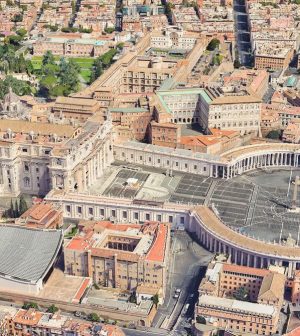- Recognizing the Signs of Hypothyroidism
- 10 Strategies to Overcome Insomnia
- Could Artificial Sweeteners Be Aging the Brain Faster?
- Techniques for Soothing Your Nervous System
- Does the Water in Your House Smell Funny? Here’s Why
- Can a Daily Dose of Apple Cider Vinegar Actually Aid Weight Loss?
- 6 Health Beverages That Can Actually Spike Your Blood Sugar
- Treatment Options for Social Anxiety Disorder
- Understanding the Connection Between Anxiety and Depression
- How Daily Prunes Can Influence Cholesterol and Inflammation
Pope Francis Eats, Walks Two Days After Colon Surgery

(Healthday News) — Following major colon surgery that was performed on Sunday, Pope Francis ate breakfast, read the newspapers and took a walk on Tuesday, the Vatican said.
“His Holiness Pope Francis rested well during the night,” said Vatican spokesman Matteo Bruni. “The post-operative recovering is regular. Routine control tests are good.”
The 84-year-old religious leader underwent three hours of surgery Sunday for a narrowing of the large intestine. The Vatican said doctors removed the left side of his colon, the Associated Press reported.
The Vatican has shared few details about the pope’s diagnosis or the procedure he underwent, saying only that he had entered the hospital for planned surgery for diverticular stenosis, or a narrowing of the colon. The surgery generally involves removing the left side of the colon and then joining up the remaining healthy parts of the large intestine.
It’s a common problem that affects roughly 80% of people over the age of 80, but surgery can become necessary if the lining of the colon becomes so scarred that it is obstructed, Dr. Yann Parc, head of staff at the Saint Antoine Hospital in Paris, told the AP. Parc was not involved in the pope’s care.
“It looks like the pope had this pathology, and understandably the Italian surgeons have removed that part and stitched it to the rectum to recreate a normal digestive transit,” Parc told the wire service.
Pope Francis has enjoyed fairly robust health during his tenure, though he lost the upper part of one lung in his youth due to an infection. He also suffers from sciatica, or nerve pain, that makes him walk with a limp, the AP said.
The pope is expected to stay in Rome’s Gemelli Polyclinic, which has a special suite reserved for popes, while he recovers, the AP said.
Francis’ next public appearance would normally be this coming Sunday, where he usually appears in a window overlooking St. Peter’s Square, blesses the faithful below and speaks for a few minutes.
If he remains hospitalized, Francis might do what one of his predecessors did while recovering at Gemelli. During some of his many stays there, St. John Paul II sometimes appeared at his hospital room window to wave and bless well-wishers gathered outside, the AP reported.
More information
Visit the American Society of Colon and Rectal Surgeons for more on diverticular disease.
Source: HealthDay
Copyright © 2026 HealthDay. All rights reserved.










